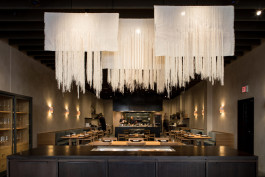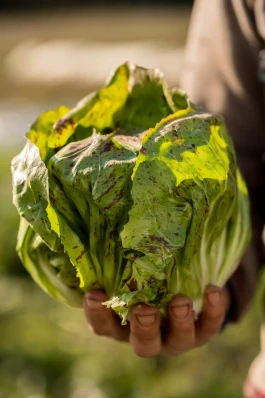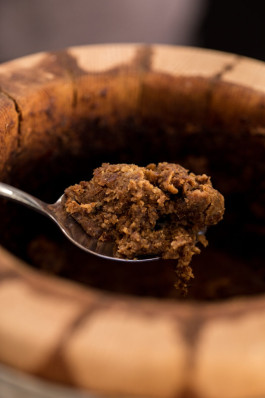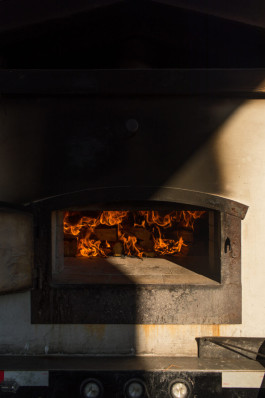FEATURE
Departures
Chef Matt Lightener first revealed his vision for ōkta, an experimental, hyper-seasonal fine-dining restaurant in the heart of Willamette Valley, to local farmer Katie Boeh in a Portland, Oregon, parking lot as Boeh unloaded her freshly harvested produce. The encounter, which eventually led to Boeh assisting in the development of the restaurant’s one-acre farm, is an apt analogy for the restaurant itself: It’s personal, unpretentious, community-oriented, and distinctly of its place.
Lightner — who first gained national attention in 2010 for his innovative foraging-focused menu at Portland’s Castagna restaurant, before foraging menus were de rigueur — had been actively shaping this vision since 2018. It was then that he returned to Oregon, a few years after resigning as executive chef at atera, the experimental tasting table in New York City’s Tribeca, where he earned two Michelin stars. As the official press statement goes, Lightner had “ambitions to rediscover and find renewed inspiration from the slower cadence of life outside the city.” Speaking in ōkta’s dining room, which opened in July 2022 in McMinnville, Oregon, the chef of few words is even more demure: “Opening a restaurant in the Willamette Valley has always been a dream.”
I understand Lightner’s desire as soon as I exit the highway on my hour-long drive from Portland to McMinnville. The golden late-afternoon sun dances through alternatively bare branches and evergreen limbs, dappling an idyllic tapestry of apple and pear orchards, heaving vegetable fields, well-loved farmhouses, grazing cows, and a smattering of the valley’s over 700 vineyards. McMinnville itself recalls Norman Rockwell’s America. Brick buildings on its tree-lined main street house an insurance agency, a vet, and a church. A yellow school bus punctuates the nostalgic scene. Traces of modernity appear as a brew pub, a single mixed-use apartment building, scattered boutiques, and several wine-tasting rooms.

The Tributary Hotel, which houses ōkta, is smack in the middle of this distinctly Oregonian jumble. Both the hotel and the restaurant are owned by husband-and-wife team Katie Jackson and Shaun Kajiwara of Jackson Family Wines in Sonoma, California, and both occupy the historic, fully renovated Taylor-Dale Hardware building. Though the building’s facade is only subtly altered, the owners’ ambitions to create a “sanctuary for guests to slow down and immerse themselves in the beauty and bounty of the region” is evident before I enter. Specifically, there’s valet parking — a nearly unheard-of amenity in Portland, let alone in McMinnville. This elevated level of service has been long in coming, ōkta’s sommelier James Laughlin tells me later that night: “This area has had award-winning wines since the ’60s. Now it has the food and service to go with it.”
This aspiration is underscored as I enter ōkta. The 26-seat restaurant greets guests with a sculptural mise-en-scène of ingredients, such as black cod on an ice bed, topped with huckleberries, chanterelles, nasturtium, and squash. “We like to do a little showcase,” explains the restaurant’s general manager Christine Langelier as she hands me a glass of Champagne, “because with the chef’s tasting menu, you don’t know what you’re going to eat tonight. Giving someone a small glimpse of what they might have gets their imagination flowing. And that’s exactly what happens when the chefs are up at the farm. Our chef de cuisine Brendan [Byer] is up there with Chef Matt and the farmer every morning, looking at what is at its peak so that they can harvest it for the night service.”
Langelier, who previously served as the general manager at Blue Hill at Stone Barns and the service director at Eleven Madison Park, is one of just four recent Willamette Valley transplants on staff — Lightner and Byer are the others. Everyone else was already local, and while each of them took their own unique path to ōkta, two common threads emerge from their stories: They were either highly recommended to the team or they actively sought out the opportunity because they were passionate about the intersection of fine dining and the local landscape. In short: It’s a staff of overachievers, as evidenced by the restaurant’s simultaneously precise and unpretentious service.


At ōkta, you don’t have a dedicated server. Dinner is a well-choreographed symphony that sees Langelier, sommeliers, sous-chefs, and even Lightner dropping by to speak to the various dishes and the restaurant’s considered layers — from the custom ceramics crafted by Lilith Rockett to maintain the temperature and texture of the creations they hold to the current status of the ōkta farm, which has evolved from that preliminary parking-lot conversation into a 1-acre plot in Yamhill County’s Ribbon Ridge American Viticultural Area.
The morning I visit the hilltop farm, the fog has just surrendered to a cloudless sky. And while harvesting Bel Fiore and Galileo varieties of radicchio, the farmers recall an agricultural journey that began with recalibrating the plot’s soil using a signature microbiome approach to soil repair, which focuses on the soil’s biology (the ratio between fungi and bacteria) rather than its chemistry (pH). Next came high-diversity, machine-free plantings and trialing of specialty crops, all while adjusting to the valley’s microclimates and increasingly unpredictable weather patterns. Two years in, they are trying their hand at experimental crops, like dry beans and milling corn.
This precipitous evolution can be seen in what the restaurant’s website defines as “a highly progressive tasting menu finely tuned to the terroir of the region.” On Wednesdays and Thursdays, the menu comprises 12 to 13 courses. On Fridays and Saturdays, it stretches to 15 or 16, while on Sundays it’s 10 courses augmented by extravagant ingredients such as caviar. In 2023, ōkta will also introduce in-room dining at The Tributary and a four-course tasting menu in ōkta’s cellar bar and lounge.
For my visit, 12 artful plates are prepared. The bounty begins with duck-egg custard topped with squash and red sea urchin: a tiny porcelain pot of pure umami. Next, a small tart with light cream is capped by a marinated French Burgundy black truffle, an effervescent foil to the pungent oil that has infiltrated too many American kitchens. Pacific rockfish follows, peppered with shitake and tiny, explosive huckleberry. Lightner’s use of the hard-to-come-by native wild berries reveals his regional literacy — as does the appearance of Dungeness crab. Paired with painted mountain grits (made from the farm’s first harvest of milling corn) and kani-dashi, a fermented, crab-based stock created by larder chef Larry Nguyen, the seafood is at the same time familiar and inscrutable. “That’s what’s exciting to me,” Lightner states as he stops by the table, speaking to the menu at large: “There are about 70 things you aren’t seeing that you’re tasting.”


Each of the courses — other highlights include golden chanterelle mushrooms with cherries; black cod with carrot amazake and komu; and a half a lemon filled with sherbet and lemon thyme — are fastidiously paired with wines. Selected by Laughlin and ōkta’s wine and beverage director Ron Acierto, they come from a nearly 200-bottle wine library that focuses on Willamette Valley wineries and features reserve bottles exclusive to The Tributary; but bottles from around the world that particularly complement Lightner’s idiosyncratic menu might also make an appearance. “The Willamette Valley is a story people need to hear,” Laughlin reiterates on his last pour. “It’s what moved me across the country.”
Ōkta is passionately writing this story’s next chapter by translating the region’s singular bounty into a future-forward tale conscientiously tied to its layered past. It’s a memorable narrative that follows you out the door by way of a quixotical after-dinner gift: shockingly successful wood-fired canelés. If you’re lucky enough to spend the night at The Tributary, the story continues in the morning as a plentiful en-suite breakfast. Literal manifestations aside, the experience follows you in the form of a profound appreciation for this Edenic pocket’s abundance and for the people looking to both preserve and celebrate it.
PUBLISHED IN DEPARTURES
PHOTOGRAPHY BY CELESTE NOCHE
view more
FEATURE
Departures
Chef Matt Lightener first revealed his vision for ōkta, an experimental, hyper-seasonal fine-dining restaurant in the heart of Willamette Valley, to local farmer Katie Boeh in a Portland, Oregon, parking lot as Boeh unloaded her freshly harvested produce. The encounter, which eventually led to Boeh assisting in the development of the restaurant’s one-acre farm, is an apt analogy for the restaurant itself: It’s personal, unpretentious, community-oriented, and distinctly of its place.
Lightner — who first gained national attention in 2010 for his innovative foraging-focused menu at Portland’s Castagna restaurant, before foraging menus were de rigueur — had been actively shaping this vision since 2018. It was then that he returned to Oregon, a few years after resigning as executive chef at atera, the experimental tasting table in New York City’s Tribeca, where he earned two Michelin stars. As the official press statement goes, Lightner had “ambitions to rediscover and find renewed inspiration from the slower cadence of life outside the city.” Speaking in ōkta’s dining room, which opened in July 2022 in McMinnville, Oregon, the chef of few words is even more demure: “Opening a restaurant in the Willamette Valley has always been a dream.”
I understand Lightner’s desire as soon as I exit the highway on my hour-long drive from Portland to McMinnville. The golden late-afternoon sun dances through alternatively bare branches and evergreen limbs, dappling an idyllic tapestry of apple and pear orchards, heaving vegetable fields, well-loved farmhouses, grazing cows, and a smattering of the valley’s over 700 vineyards. McMinnville itself recalls Norman Rockwell’s America. Brick buildings on its tree-lined main street house an insurance agency, a vet, and a church. A yellow school bus punctuates the nostalgic scene. Traces of modernity appear as a brew pub, a single mixed-use apartment building, scattered boutiques, and several wine-tasting rooms.
The Tributary Hotel, which houses ōkta, is smack in the middle of this distinctly Oregonian jumble. Both the hotel and the restaurant are owned by husband-and-wife team Katie Jackson and Shaun Kajiwara of Jackson Family Wines in Sonoma, California, and both occupy the historic, fully renovated Taylor-Dale Hardware building. Though the building’s facade is only subtly altered, the owners’ ambitions to create a “sanctuary for guests to slow down and immerse themselves in the beauty and bounty of the region” is evident before I enter. Specifically, there’s valet parking — a nearly unheard-of amenity in Portland, let alone in McMinnville. This elevated level of service has been long in coming, ōkta’s sommelier James Laughlin tells me later that night: “This area has had award-winning wines since the ’60s. Now it has the food and service to go with it.”
This aspiration is underscored as I enter ōkta. The 26-seat restaurant greets guests with a sculptural mise-en-scène of ingredients, such as black cod on an ice bed, topped with huckleberries, chanterelles, nasturtium, and squash. “We like to do a little showcase,” explains the restaurant’s general manager Christine Langelier as she hands me a glass of Champagne, “because with the chef’s tasting menu, you don’t know what you’re going to eat tonight. Giving someone a small glimpse of what they might have gets their imagination flowing. And that’s exactly what happens when the chefs are up at the farm. Our chef de cuisine Brendan [Byer] is up there with Chef Matt and the farmer every morning, looking at what is at its peak so that they can harvest it for the night service.”
Langelier, who previously served as the general manager at Blue Hill at Stone Barns and the service director at Eleven Madison Park, is one of just four recent Willamette Valley transplants on staff — Lightner and Byer are the others. Everyone else was already local, and while each of them took their own unique path to ōkta, two common threads emerge from their stories: They were either highly recommended to the team or they actively sought out the opportunity because they were passionate about the intersection of fine dining and the local landscape. In short: It’s a staff of overachievers, as evidenced by the restaurant’s simultaneously precise and unpretentious service.
At ōkta, you don’t have a dedicated server. Dinner is a well-choreographed symphony that sees Langelier, sommeliers, sous-chefs, and even Lightner dropping by to speak to the various dishes and the restaurant’s considered layers — from the custom ceramics crafted by Lilith Rockett to maintain the temperature and texture of the creations they hold to the current status of the ōkta farm, which has evolved from that preliminary parking-lot conversation into a 1-acre plot in Yamhill County’s Ribbon Ridge American Viticultural Area.
The morning I visit the hilltop farm, the fog has just surrendered to a cloudless sky. And while harvesting Bel Fiore and Galileo varieties of radicchio, the farmers recall an agricultural journey that began with recalibrating the plot’s soil using a signature microbiome approach to soil repair, which focuses on the soil’s biology (the ratio between fungi and bacteria) rather than its chemistry (pH). Next came high-diversity, machine-free plantings and trialing of specialty crops, all while adjusting to the valley’s microclimates and increasingly unpredictable weather patterns. Two years in, they are trying their hand at experimental crops, like dry beans and milling corn.
This precipitous evolution can be seen in what the restaurant’s website defines as “a highly progressive tasting menu finely tuned to the terroir of the region.” On Wednesdays and Thursdays, the menu comprises 12 to 13 courses. On Fridays and Saturdays, it stretches to 15 or 16, while on Sundays it’s 10 courses augmented by extravagant ingredients such as caviar. In 2023, ōkta will also introduce in-room dining at The Tributary and a four-course tasting menu in ōkta’s cellar bar and lounge.
For my visit, 12 artful plates are prepared. The bounty begins with duck-egg custard topped with squash and red sea urchin: a tiny porcelain pot of pure umami. Next, a small tart with light cream is capped by a marinated French Burgundy black truffle, an effervescent foil to the pungent oil that has infiltrated too many American kitchens. Pacific rockfish follows, peppered with shitake and tiny, explosive huckleberry. Lightner’s use of the hard-to-come-by native wild berries reveals his regional literacy — as does the appearance of Dungeness crab. Paired with painted mountain grits (made from the farm’s first harvest of milling corn) and kani-dashi, a fermented, crab-based stock created by larder chef Larry Nguyen, the seafood is at the same time familiar and inscrutable. “That’s what’s exciting to me,” Lightner states as he stops by the table, speaking to the menu at large: “There are about 70 things you aren’t seeing that you’re tasting.”
Each of the courses — other highlights include golden chanterelle mushrooms with cherries; black cod with carrot amazake and komu; and a half a lemon filled with sherbet and lemon thyme — are fastidiously paired with wines. Selected by Laughlin and ōkta’s wine and beverage director Ron Acierto, they come from a nearly 200-bottle wine library that focuses on Willamette Valley wineries and features reserve bottles exclusive to The Tributary; but bottles from around the world that particularly complement Lightner’s idiosyncratic menu might also make an appearance. “The Willamette Valley is a story people need to hear,” Laughlin reiterates on his last pour. “It’s what moved me across the country.”
Ōkta is passionately writing this story’s next chapter by translating the region’s singular bounty into a future-forward tale conscientiously tied to its layered past. It’s a memorable narrative that follows you out the door by way of a quixotical after-dinner gift: shockingly successful wood-fired canelés. If you’re lucky enough to spend the night at The Tributary, the story continues in the morning as a plentiful en-suite breakfast. Literal manifestations aside, the experience follows you in the form of a profound appreciation for this Edenic pocket’s abundance and for the people looking to both preserve and celebrate it.
PUBLISHED IN DEPARTURES
PHOTOGRAPHY BY CELESTE NOCHE
view more